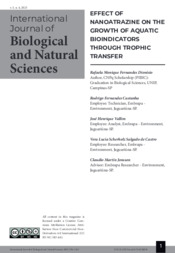Effect of nanoatrazine on the growth of aquatic bioindicators through trophic transfer.
Effect of nanoatrazine on the growth of aquatic bioindicators through trophic transfer.
Autoria: DIONISIO, R. M. F.; CASTANHA, R. F.; VALLIM, J. H.; CASTRO, V. L. S. S. de; JONSSON, C. M.
Resumo: Abstract: Atrazine is a herbicide that has stood out in recent years for being one of the most commercialized pesticides in the country, being used to control weeds, mainly in corn, sugar cane and sorghum plantations. The nanoencapsulation of this compound has been a strategy to combat environmental impacts in agriculture. The objective of this work is to evaluate the effects of nanoatrazine on the growth of bioindicators through trophic transfer, focusing on harmful effects for species present in aquatic environments. The organisms were exposed to the compounds ATZ-NPZ (atrazine encapsulated in zein nanoparticles) and ATZ-PCL (atrazine encapsulated in poly-epsilon-caprolactone nanoparticles), in the presence and absence of organic matter. No significant difference (p>0.05) was observed between treatments and controls, with the exception of ATZ-PCL 0.002 mg/L in the absence of organic matter for Daphnia magna. This microcrustacean showed a significant increase of 31% in the growth rate compared to the control group. Our study shows that there are no adverse effects on the development of bioindicators, as the trophic transfer of these compounds would not pose risks to fish and microcrustaceans. The results indicate positive aspects in the use of nanoatrazine as a viable alternative for agriculture, aiming at a decrease in environmental impacts.
Ano de publicação: 2023
Tipo de publicação: Artigo de periódico
Unidade: Embrapa Meio Ambiente
Palavras-chave: Animal Aquático, Atrazine, Bioindicators, Environmental impact, Herbicida, Herbicides, Impacto Ambiental, Nanoatrazine, Nanoparticles, Trophic transfer, toxicity
Observações
1 - Por padrão são exibidas publicações dos últimos 20 anos. Para encontrar publicações mais antigas, configure o filtro ano de publicação, colocando o ano a partir do qual você deseja encontrar publicações. O filtro está na coluna da esquerda na busca acima.
2 - Para ler algumas publicações da Embrapa (apenas as que estão em formato ePub), é necessário ter, no celular ou computador, um desses softwares gratuitos. Sistemas Android: Google Play Livros; IOS: iBooks; Windows e Linux: software Calibre.
Acesse outras publicações
Acesse a Base de Dados da Pesquisa Agropecuária (BDPA) para consultar o acervo completo das bibliotecas da Embrapa.

